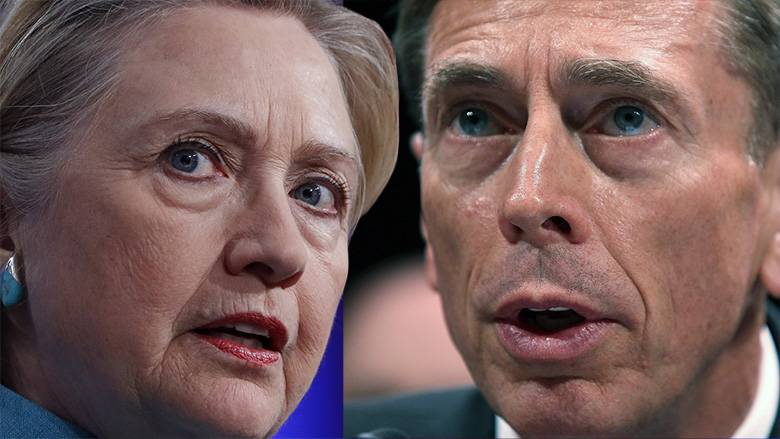
Hillary Clinton is unlikely to face criminal charges — a contrast with the case of David Petraeus, who pleaded guilty to misdemeanor charges for revealing classified info to his biographer. (Getty)
FBI Director James Comey announced July 5 that the FBI is not recommending criminal charges against Hillary Clinton in the controversy surrounding her email server. Comey did find some fault, though, with Clinton and her colleagues, saying in part:
Although we did not find clear evidence that Secretary Clinton or her colleagues intended to violate laws governing the handling of classified information, there is evidence that they were extremely careless in their handling of very sensitive, highly classified information.
Donald Trump reacted by contrasting the lack of charges against Hillary Clinton with criminal charges against retired General and CIA Director David Petraeus, who pleaded guilty to a misdemeanor for mishandling classified information during an extramarital affair he had with a biographer. In the Clinton case, Comey said the investigation revolved around “whether classified information was transmitted on that personal system.”
Democratic political consultant and commentator David Axelrod immediately fired back, saying Trump was wrong in his Clinton-Petraeus comparison.
So, does Trump have a point? What specifically was the evidence against Petraeus? It turns out the comparison is a bit subjective, but there are definitely ways the cases differ. David Petraeus admitted lying to investigators; there is no evidence Hillary Clinton did (although she told the public she had not sent classified materials in her emails.)
There’s also the difference of intent; Petraeus knew the information contained classified information; it’s unclear whether Hillary did. (However, the statutes being looked at in Clinton’s case required either intent or gross negligence, according to Comey.) Comey did say a few of the emails in the Clinton case had classified markers but others did not; however, he also said in his statement that someone in Clinton’s position should have known better and that she was extremely careless. (The conservative National Review has jumped on the “gross negligence” aspect in the law to argue that Clinton could have faced charges. After all, is “extremely careless” – as Comey described the actions of Clinton or her co-workers – the same as “grossly negligent,” the statutory term?).
There are some similarities too: Both Clinton and Petraeus were careless with classified materials. Both Clinton and Petraeus clearly had classified materials containing top government secrets that ended up being shared in an unclassified forum (“black books” in Petraeus’ case, and private servers in Clinton’s).
Petraeus gave them to someone else in his personal life who wasn’t supposed to have them, but the sensitive information wasn’t made public; Clinton sent the classified materials electronically to work colleagues who presumably had a right to see them; the FBI couldn’t rule out that Clinton’s emails were hacked but had no direct evidence they were accessed by hostile people. In both cases, there is not evidence that the actions of Clinton or Petraeus caused direct harm to the U.S. intelligence community (in Petraeus’ case because Paula Broadwell didn’t publish the secrets he shared, and in Clinton’s case because there was no direct evidence of hacking). In both cases, they took actions that opened the possibility that could have happened, though.
Here are 5 facts you need to know about the specifics of the Petraeus case and how it compares to Clinton’s:
1. Petraeus Pleaded Guilty To Giving Classified Information to the Woman With Whom He Was Having an Affair & Clinton Used Private Servers To Exchange Classified Information With Co-Workers
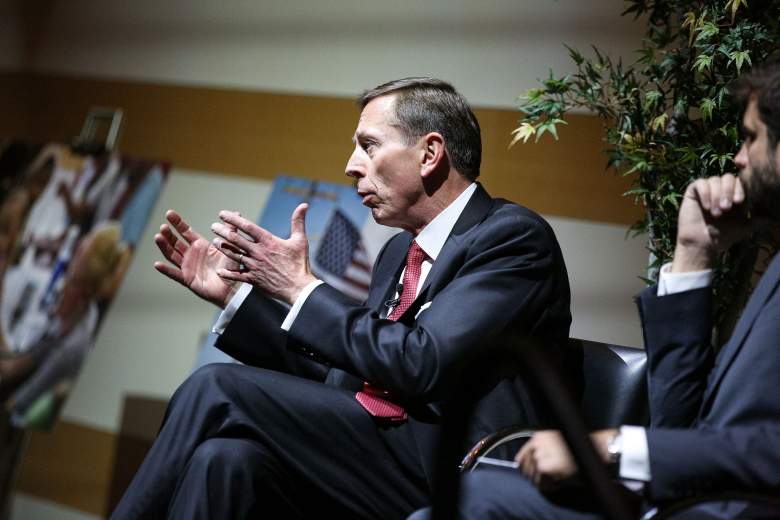
David Petraeus. (Getty)
The affair between David Petraeus and Paula Broadwell, his biographer, is well known. In the criminal case, according to the Washington Post, Petraeus admitted: “That he improperly removed and retained highly sensitive information in eight personal notebooks that he gave the biographer, Paula Broadwell, to read.”
NPR reported that prosecutors said the books Petraeus gave to Broadwell, known as the “Black Books,” contained sensitive information that was classified.
A total of eight such books (hereinafter the “Black Books”) encompassed the period of defendant David Howell Petraeus’s ISAF Command and collectively contained classified information regarding the identities of covert officers, war strategy, intelligence capabilities and mechanisms, diplomatic discussions, quotes and deliberative discussions from high-level National Security Council meetings, and defendant David Howell Petraeus’s discussions with the President of the United States of America. The Black Books contained national defense information, including Top Secret/SCI and code word information.
In the Clinton case, FBI Director Comey said the investigation focused on the following:
Our investigation looked at whether there is evidence classified information was improperly stored or transmitted on that personal system, in violation of a federal statute making it a felony to mishandle classified information either intentionally or in a grossly negligent way, or a second statute making it a misdemeanor to knowingly remove classified information from appropriate systems or storage facilities.
The Justice Department ultimately decides whether to file charges against Clinton. Comey said Clintons’ lawyers did the sorting to determine which of her emails were work-related but said investigators didn’t find evidence of intentional misconduct in the sorting.
2. Petraeus Got a Deal Partly Because the Classified Information was Never Published But FBI Director Says Clinton’s Emails Could Have Been Hacked
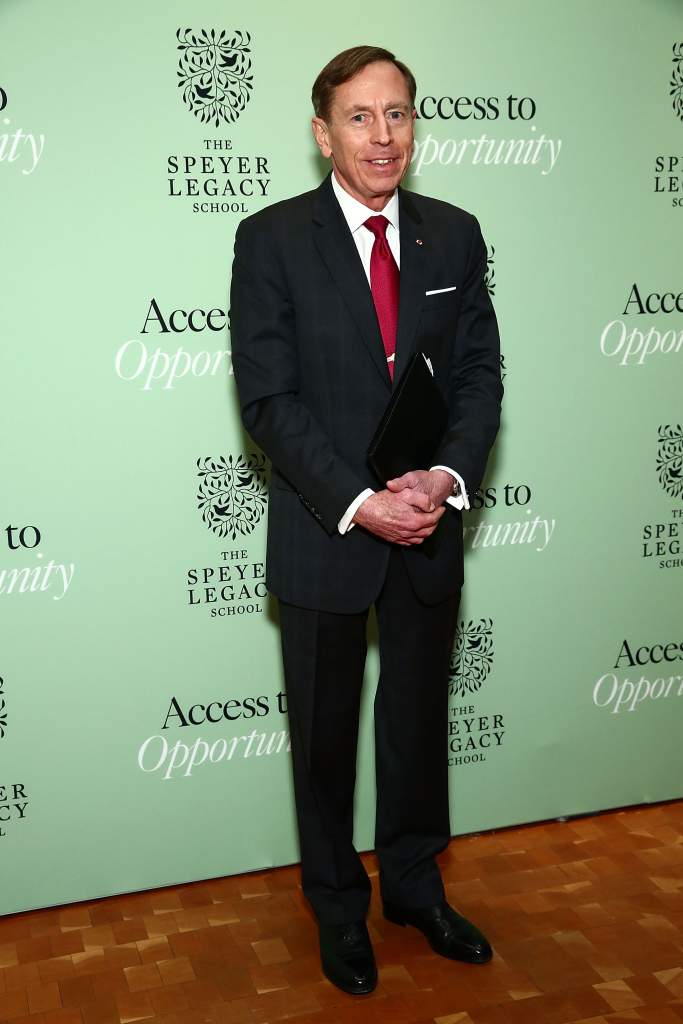
David Petraeus. (Getty)
The Washington Post reports that FBI agents were upset that Petraeus did not receive tougher charges because he initially denied providing classified information to Broadwell, prosecutors said. Wrote the Post:
The deal angered FBI agents who worked on the lengthy investigation and who thought Petraeus should have been treated more harshly because of the information in the notebooks and what they considered his lack of candor.
According to CNN, officials agreed to the deal with Petraeus because of the lack of damage caused.
Prosecutors agreed to not send Petraeus to jail because the classified information was never released to the public or published in the biography of him that Broadwell wrote.
In the Clinton case, Comey said that the agency found no direct evidence Clinton’s emails were hacked by hostile sources, but added, “we assess it is possible that hostile actors gained access to Secretary Clinton’s personal e-mail account.”
Comey continued that:
Although there is evidence of potential violations of the statutes regarding the handling of classified information, our judgment is that no reasonable prosecutor would bring such a case.
3. Prosecutors Said Petraeus Lied to the FBI and CIA But There Is No Evidence Clinton Lied to Authorities
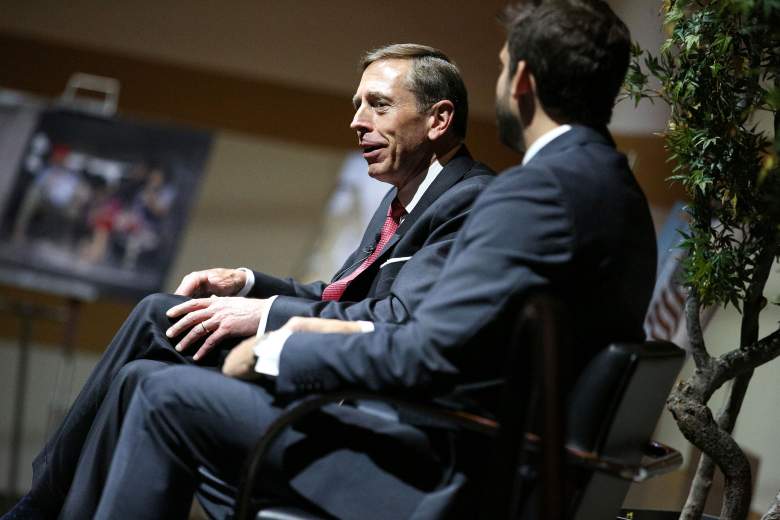
David Petraeus. (Getty)
Ultimately, Petraeus pleaded guilty to a misdemeanor charge of mishandling classified information in a plea deal that saw him receive probation and a fine. ABC News said Petraeus received 2 years probation and a $100,000 fine for what the network called “classified leaks.” ABC reported that Jill Westmoreland Rose, the acting U.S. Attorney handling the case, had said:
Today David Petraeus admitted that he removed and obtained classified and that he lied to the FBI and CIA.
The fine was higher than the $40,000 prosecutors recommended, ABC News said. The judge increased it, explaining he wanted “to send a clear message discouraging actions like Petraeus’s.”
Trump isn’t the only person to accuse officials of having a double standard when it comes to Petraeus. When Petraeus reached his plea agreement, Abbe Lowell, a lawyer for a man accused of leaking information to the news media, wrote the Justice Department that the deal showed a “profound double standard,” CNN said. Lowell referred to former CIA Director Leon Panetta when he wrote:
High-level officials (such as General Petraeus, and, earlier, Leon Panetta) leak classified information to forward their own agendas (or to impress their mistresses) with virtual impunity.
Hillary Clinton did publicly deny that she had sent classified materials in the emails, but that’s different than doing it to the CIA and FBI. Clinton was interviewed by FBI investigators on Saturday; specifically details of what she told them have not yet been released.
4. Prosecutors Contemplated Felony Charges Against Petraeus but Comey Felt Clinton’s Case Differed From Others Prosecuted, in Part Because of Intent

David Petraeus in 2015. (Getty)
The Washington Post says that federal prosecutors wanted to force a plea against Petraeus, so they contemplated whether to file felony charges against him. The Post said FBI Director James Comey and Attorney General Eric Holder attended a presentation by prosecutors that was meant to mirror what they would present to Petraeus’ lawyers. Some prosecutors and Petraeus’ lawyers did not feel felony charges would stick, the Post said.
The presentation included felony charges: lying to the FBI and violating a section of the Espionage Act. A conviction on either carried potentially years in prison.
Comey said he could not find a case similar to Clinton’s (without mentioning Petraeus’ name in his statement). He said other cases prosecuted involved “some combination of: clearly intentional and willful mishandling of classified information; or vast quantities of materials exposed in such a way as to support an inference of intentional misconduct; or indications of disloyalty to the United States; or efforts to obstruct justice. We do not see those things here.”
However, the FBI director admitted others might be treated differently, saying:
To be clear, this is not to suggest that in similar circumstances, a person who engaged in this activity would face no consequences. To the contrary, those individuals are often subject to security or administrative sanctions. But that is not what we are deciding now.
5. Both Clinton and Petraeus Were Careless With Government Secrets
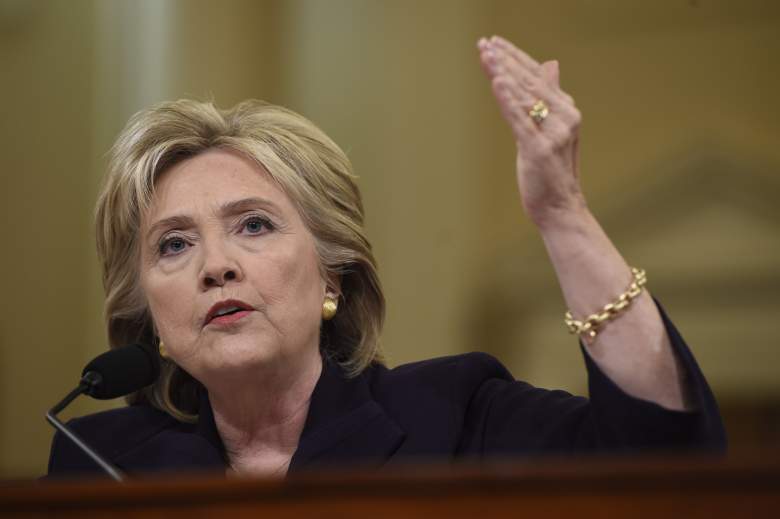
Hillary Clinton testifies before the House Select Committee on Benghazi. (Getty)
In the lengthy statement, James Comey said some emails were classified in Clinton’s server, and he said the conversations should not have occurred on a private server.
For example, seven e-mail chains concern matters that were classified at the Top Secret/Special Access Program level when they were sent and received. These chains involved Secretary Clinton both sending e-mails about those matters and receiving e-mails from others about the same matters. There is evidence to support a conclusion that any reasonable person in Secretary Clinton’s position, or in the position of those government employees with whom she was corresponding about these matters, should have known that an unclassified system was no place for that conversation. In addition to this highly sensitive information, we also found information that was properly classified as Secret by the U.S. Intelligence Community at the time it was discussed on e-mail (that is, excluding the later “up-classified” e-mails).
None of these e-mails should have been on any kind of unclassified system, but their presence is especially concerning because all of these e-mails were housed on unclassified personal servers not even supported by full-time security staff, like those those found at Departments and Agencies of the U.S. Government—or even with a commercial service like Gmail.
In his statement, Comey also provided additional details about classified information sent via Clinton’s servers.
From the group of 30,000 e-mails returned to the State Department, 110 e-mails in 52 e-mail chains have been determined by the owning agency to contain classified information at the time they were sent or received. Eight of those chains contained information that was Top Secret at the time they were sent; 36 chains contained Secret information at the time; and eight contained Confidential information, which is the lowest level of classification. Separate from those, about 2,000 additional e-mails were “up-classified” to make them Confidential; the information in those had not been classified at the time the e-mails were sent.
You can read Comey’s full statement here.